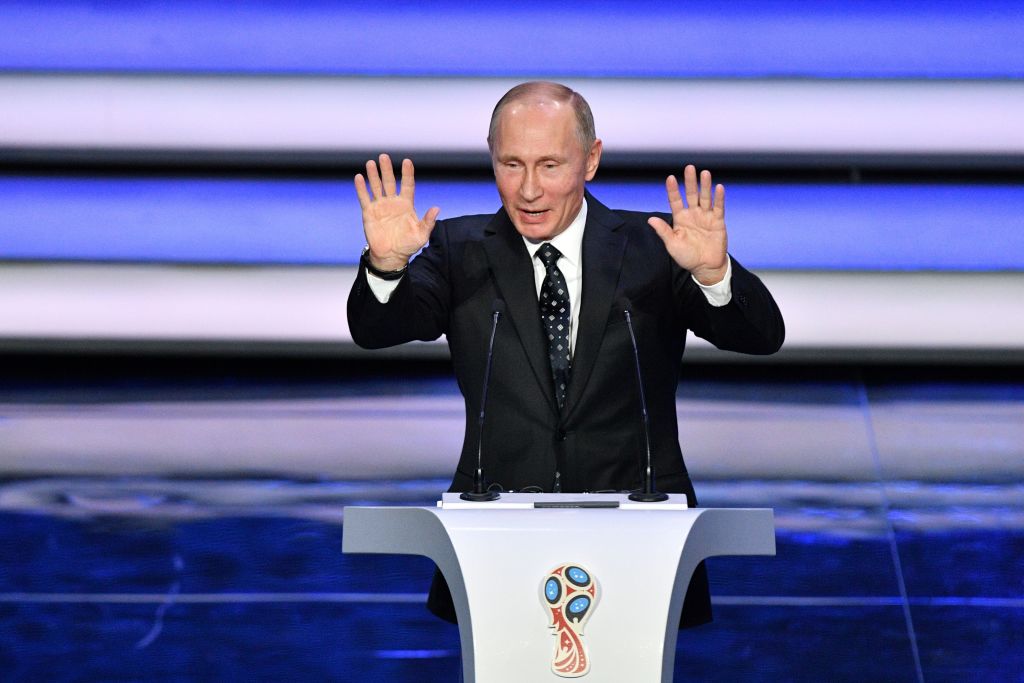Boris Johnson is right that Vladimir Putin will seek to use the World Cup this summer in the same way that Hitler did with the Berlin Olympics in 1936. Putin doesn’t care much for football, but the World Cup is a useful chance to confer legitimacy on his pseudo-democratic regime by basking in the glory of a tournament watched the world over. Hitler did the same when the Olympics came to Berlin, milking the Games for all they were worth and opening them himself amidst plenty of fanfare. The Führer’s aim was to present Germany as a great power. When the World Cup opens this summer in Moscow, Putin will be aiming to send a similar signal to the world: showcasing Russia as a powerful country and portraying himself as the Russians’ legitimately-elected president. Both messages are misrepresentations of reality. Far from putting Russia at the heart of world politics, Putin is, in fact, increasingly isolating his country. While the reports of ballot boxes being stuffed and the lack of any viable alternative to Putin in Russia’s recent presidential election make it clear that Putin’s legitimacy is also a sham.
The parallels between the Olympics of 1936 and this summer’s World Cup extend beyond the two leaders. Hitler’s Olympics were a ready-made propaganda opportunity for the Nazi regime. The Berlin Olympics were also the first Games to be broadcast live on television, and the Nazis duly capitalised on this by presenting the Germans as a resurgent people united by a common ethnicity which gave them enviable sporting prowess. Russian television viewers will be saturated this summer with images of their team and their president will portray himself as its manager-in-chief. How far Russia progresses doesn’t really matter: this is Russia versus the rest of the world.
Yet even though Boris was right to draw a link between the two events, that doesn’t mean he should have said so. Keeping English football fans safe – some of whom can be a notoriously provocative bunch – won’t be easy. The Foreign Secretary’s comments will only make matters harder. For Russia, a country that prides itself on its role in defeating Nazi Germany, it is difficult to think of a parallel better suited to riling up Russian football fans. The Russian Ambassador to the UK has just blown his top about it, saying the comparison was ‘insulting to the Russian people’. Boris would have done better to confine his criticism of Putin to the attempted murder of Sergei and Yulia Skripal. Now it’s too late, and there will inevitably be worries of a repeat of the violence that marred England’s game with Russia at Euro 2016. “Well trained” Russian football hooligans were blamed for the trouble back then, and Putin later made light of it, joking that: “I don’t know how 200 Russian fans could beat several thousand of the British.” There were also reports that the Kremlin sanctioned the violence, amid claims that some of those involved were identified as having ties with the Russian military.
But the bigger mistake isn’t Boris’s; it’s Fifa’s. The World Cup should have been moved from Russia to Belgium and the Netherlands, which bid jointly for this summer’s tournament. The Netherlands deserved to host the event since 193 Dutch people were killed when Malaysian Airlines flight 17 was shot down over eastern Ukraine, almost certainly by Russian-backed guerrillas using a Russian-supplied surface-to-air missile in July 2014. The lesson of the 1936 Olympics is that appeasement of aggressive nationalist thugs bent on expansion is a mistake. The next Olympics were held, not in Tokyo in 1940 as planned, but in 1948 in London. They were a pat on the back for Britain for finally abandoning appeasement.
Dr Paul Maddrell is lecturer in modern German history at Loughborough University. He is a co-editor of Spy Chiefs, recently published by Georgetown University Press






Comments